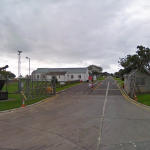A junk food advertising ban on London’s transport network is estimated to have contributed to a 1,000-calorie cut in unhealthy items in people’s weekly shop.
For chocolate and confectionery, there was an almost 20% decrease in average weekly household purchases of energy from these products.
That’s the equivalent of about 1.5 fewer bars of chocolate per person each week.
The study by the London School of Hygiene and Tropical Medicine (LSHTM) looked at the effect of the ban, which targets items high in fat, salt and sugar (HFSS).
Services such as the Tube, buses, taxis, DLR and bus stops are all covered by the rules – designed to tackle childhood obesity.
Nearly two million weekly purchases of HFSS products were examined for the study, which compared London households with the north of England between June 2018 and December 2019.
It found the policy was associated with an estimated 1,001 (6.7%) calorie fall in average weekly purchases of energy from HFSS items.
Man arrested at Heathrow and charged with 2017 murder of Seun McMillan in north London
London: Met Police say item ‘not suspicious’ after bridge closures
‘I thought I might die’: Friends describe chaos of floor collapse at Two More Years bar in Hackney
The 19.4% fall in chocolate and confectionery purchases amounted to 317.9 calories.
Researchers found some indication the effect of the ban was larger in households with obese people.
“The impacts we observed are larger than those reported for the UK soft drinks industry levy, those predicted for a 9pm advertising watershed on HFSS foods, or a 20% tax on sugary snacks,” said lead investigator Professor Steven Cummins.
He said the findings were more evidence of the effectiveness of advertising restrictions and supported the case for a proposed ban on junk food ads online.
Professor Cummins said more research was needed but that policies like London’s “could have a significant impact” on cutting consumption of unhealthy food – and could even cross over to alcohol and gambling.
London Mayor Sadiq Khan said he was “pleased to see the positive impact these groundbreaking measures have had”.
However, Advertising Association boss Stephen Woodford said the reason junk food calories reduced was likely to be more complex and that the study appeared “optimistic” compared with others.
“The UK’s obesity challenge is a complex and multi-faceted one and needs solutions that are targeted and effective,” he said.
“Blanket bans on advertising even by the government’s own estimates have marginal impacts on food preferences and calorie reduction, so there will be many reasons for the changes in purchasing habits seen in the London area.”
The study is published in the peer-reviewed PLOS Medicine journal.






















